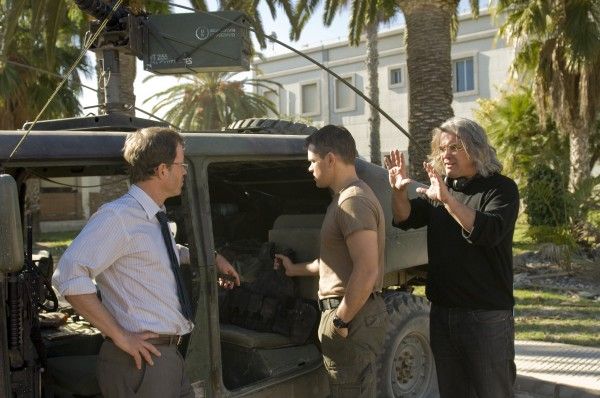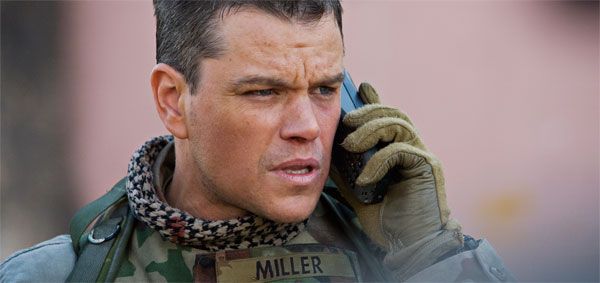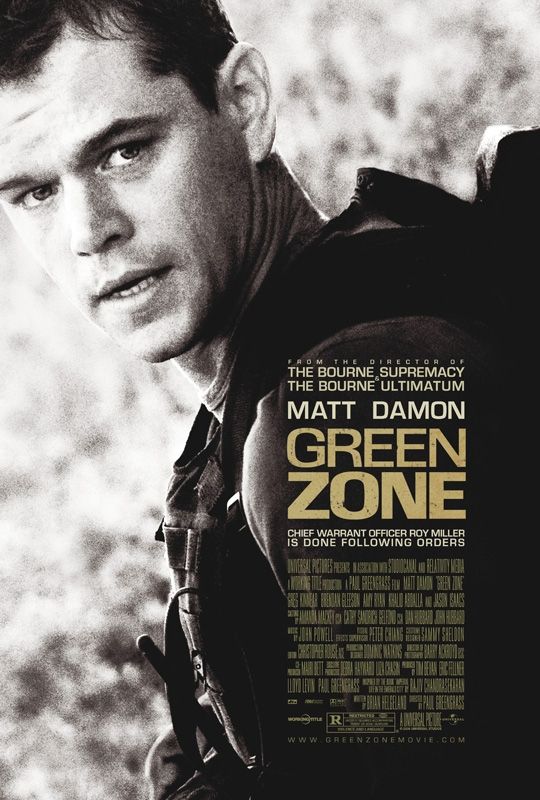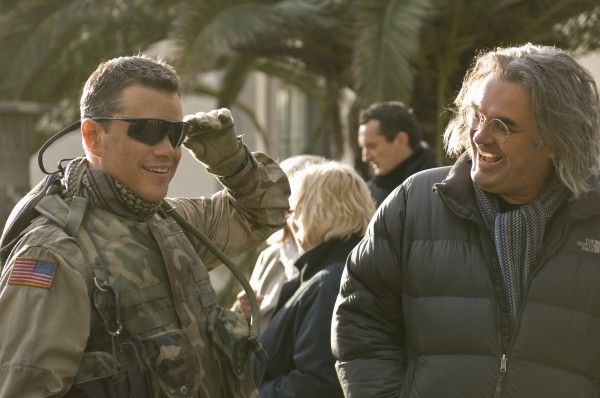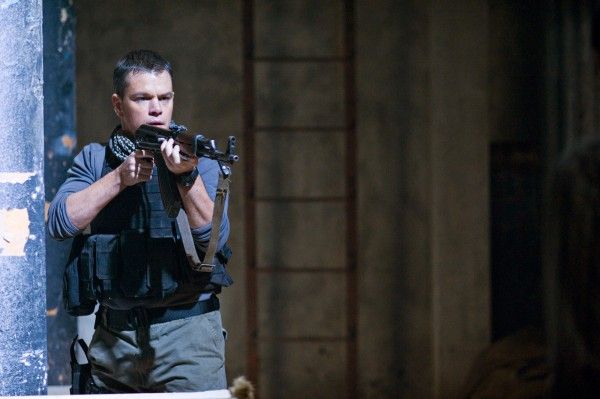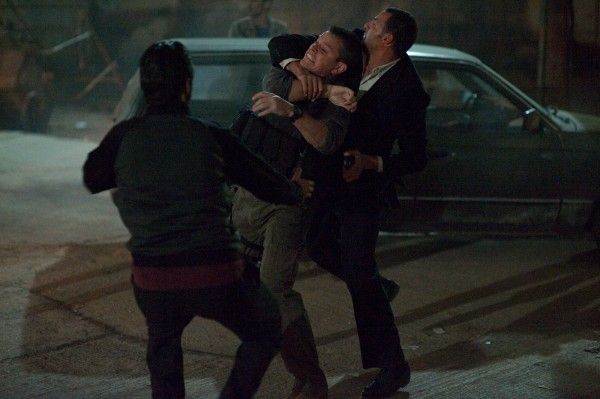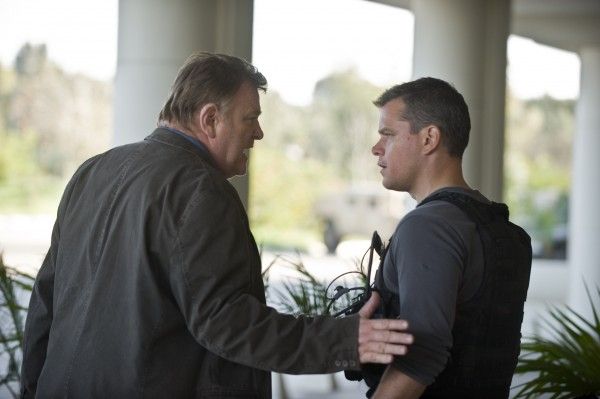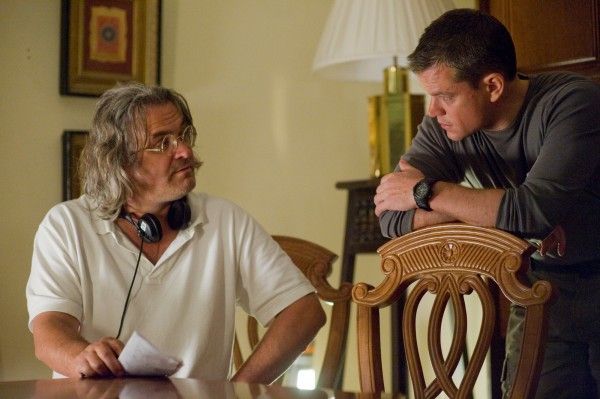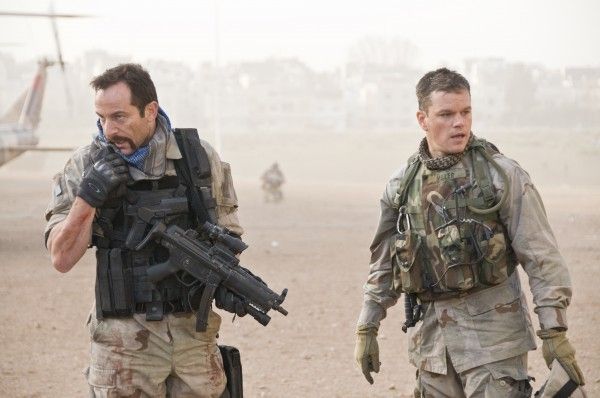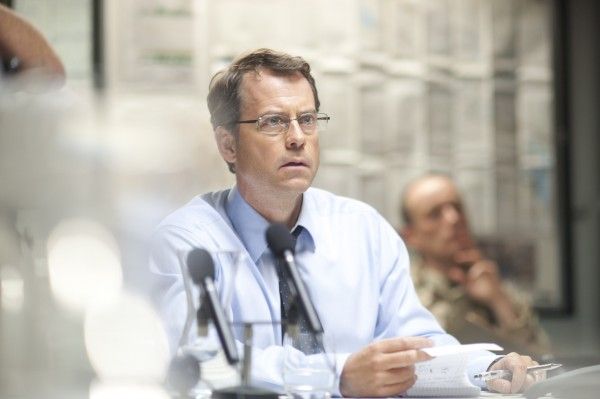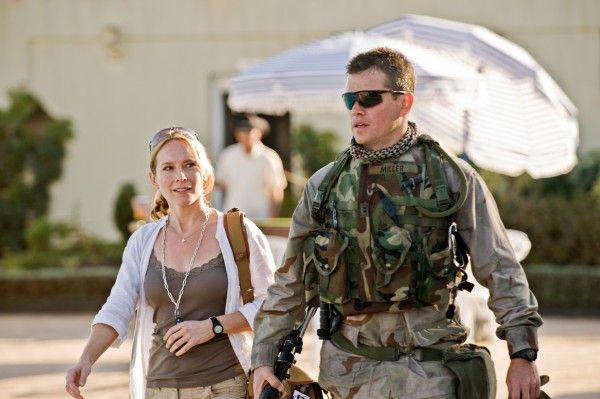Opening tomorrow is the new film from director Paul Greengrass (The Bourne Supremacy, The Bourne Ultimatum, United 93) Green Zone. Starring Matt Damon as a weapons inspector looking for WMD's in the early days of the U.S. led Iraqi War, Greengrass has taken his trademark style and applied it to a real story. Trust me when I say, if you enjoyed the last two Bourne movies, I'm extremely confident you'll like Green Zone.
To help promote the film, I recently got to participate in a small roundtable interview with Matt Damon in New York City. While getting even 15 minutes with Damon would be great as he's an A list actor, our roundtable interview lasted over 30 minutes and we literally discussed everything. From making Green Zone to every project he has coming up, no stone was left unturned. Trust me, if you're a fan of this great actor, this is a must read interview. As always, I've also provided the audio. Hit the jump to check it out and definitely catch Green Zone this weekend:
Below is the complete transcript. Click here if you'd rather listen to it. Green Zone also stars Greg Kinnear, Brendan Gleeson, Amy Ryan, Khalid Abdalla and Jason Isaacs. And here's a link to a bunch of movie clips. Check them out to learn more about the movie.
And one last thing, while Matt Damon is one of the biggest stars in Hollywood, the guy doesn't do interviews with publicists in the room and will answer any question thrown his way. One of the coolest and nicest actors I have ever interviewed.
--
Question: I know we're here for Green Zone, but I have to say, as a fellow New Englander, I just read online that you're going to be playing a Yankees fan.
Matt Damon: Man, shit, I've been asked that question so many times. Yeah, I haven't seen that script yet, but I know Ben's been - Ben was really high on that story. It's kind of like a well-known story about these two pitchers for the Yankees who swapped wives.
See, that's ok. That's a little bit better.
Damon: [SOUTHERN ACCENT] "I'm talkin' about wife swappin'!" Always makes me think of Raising Arizona.
New Englander here. Seeing you as a Yankee...I don't know.
Damon: It's like when Billy Crystal was doing the movie 61 and I went and I talked to him and I said, "God, I think you're going to make a really good movie, but I don't think I can put that hat on."
Now you can?
Damon: MD: Well, we'll see what happens. If Ben's really hot to do it and it's - and, you know, we get a great script, then, you know... I'll just tell people it was Photoshopped.
How relevant is this story to 2010?
Damon: Uh... well... probably depends on your perspective. I think it's extremely relevant. I mean, I think the last thing I'm saying to the Kinnear character about the reasons we go to war matter, that is highly relevant. I think it's extremely relevant -- and not a partisan thing, either. That's a sentiment, I think, that most people share... um... you know, no matter what you believe, that really matters. And I think the central question of the movie was something that I think we all asked. Our idea was to have a character who was a good soldier, who went there thinking he was going to find something and then got there and didn't find it, and then asked the question "why?" Which I think is kind of what happened for all of us. We were told something was going to happen and it didn't. And then we went, "Oh, how did we get here? Oh, right, the weapons." "Well, what happened with that? Where were they?" Um... you know, so I think those are kind of fundamental questions.
OK, so, Jason Isaacs didn't want to get into the percentages of truth to the story, perhaps you could -- what percentage would you assign, as far as the sequence of events that are most important to the movie?
Damon: Like which? There were no weapons in Iraq. [LAUGHTER] That's true. A lot of people went there thinking there were. That's true, too. No one's really explained what the fuck happened. That's true too. [LAUGHTER] But those are the central questions, I think, and that's the big -- I mean, what we have in the movie is, yeah, we have a guy playing kind of a neocon type who actually invented a source, right? So that's not based on anything, that's obviously something that, for the movie, for the kind of architecture of a thriller to work, it needs to boil down to a couple characters, you know, who are standing in for, kind of, you know -- so that, you know, that stuff is, uh, you know, obviously the movie.
But the central question of, like, WMD was, uh, you know, I mean, that's obviously, uh, true. I mean, Monty, the guy who -- my character is based on a guy -- we had these things called mobile exploitation teams so, in the movie, I'm MET Team Delta. Well, Monty actually led MET Team Alpha, and he told me he helped put the teams together and he said, you know, he was racing the other team leaders, 'cause, who was going to be first on CNN, holding up, you know, the weapons. And, in our movie, you know, that first really exciting kind of sequence at Diwaniya, I come out of that and say, "Where did this intel come from?" Is this United Nations? Like, what, you know, this is the fourth time, you know, and I make some comment about, you know, so it's clear that this has happened to us before. Monty, in fact, told me that the first site that he went to, he went ripping in there with everything and his intel packet, and it was listed as a dual-use facility. And I think it was a porcelain factory. But it was listed as a dual-use facility, which means it's a porcelain factory, but that's really a cover, because what they're really making is some bad weapons there. And he went in there and he looked around and he said, "This is all bullshit."
From the first site.
Damon: He said the first site he went into, he knew there was something horribly wrong. Because he said there's no way a rational person could come in here and say they're making something here other than porcelain, because that's all this place can do. And, so, that kind of thing -- so here's a guy that's on the pointy end of the spear there, you know, hunting for the weapons, and that experience was the one that they were having, you know, where they'd go to the J-MOC and say, like, "Where did this intel -- is this the same source we've been using, because we haven't found shit. And these things keep telling us there's going to be something in this factory and there's nothing in these places. So what's going on?
Do you think that there's any risk of somebody less informed watching this movie and drawing conclusions based on the stuff that was for the sake of storytelling or whatever. Because I think it's a fantastic movie, but I have the understanding that it's entertainment.
Damon: Right... it's entertainment, but kind of based in the real world, and the whole kind of -- what we were trying to do was see, like, you know, you have, like, the Bourne world, which is obviously kind of a heightened kind of, you know, thing and Bourne's kind of a superhero character, and so we wanted to see if we could kind of take that extra step into the real world and bring the kind of Bourne aesthetic, but set it against -- and, when we read Rajiv's book, which is great -- Imperial Life in the Emerald City -- that provided the perfect backdrop. That kind of surreal Green Zone, where all of this kind of conspiracy and, you know, paranoia and intrigue and all that stuff -- because that's where everybody went to kind of build, you know, the shining city on the hill.
But it was a kind of surreal place, where they had Pizza Hut and they had all those things, and they were disconnected from the -- what was really going on. So it was a kind of fertile -- like if you start with the question of the weapons, which was the reason, ostensibly, that we went there, so you start with a guy who's a genuinely good soldier, who believes the weapons are there, and, you know, you see him not find them, then the next logical question he asks is, "OK, but then what's going on? Why aren't they here?" And that search kind of brings him into, you know, this world of the Green Zone, where he's suddenly, he's a very, he's got very simple motives. He's there to win a war, to save lives and he's got very noble motives, but he suddenly finds himself in a very complicated world with very powerful, competing agendas. And he's in the middle of it. So that is like kind of a classic thriller, you know, uh, architecture. And that was what we set out to do, to see if we could make a big action thriller that, uh, kind of spoke to the world that we live in.
Why do you to do these kinds of movies? Because, if you look at your resume, you've done Syriana, The Informant -- they all deal with historical or real-world issues -- partially fictionalized, but definitely things like -- are these things that interested you, and you feel like you want to tell the stories?
Damon: Yeah, I don't really have an overarching strategy, um, it's kind of a one-off thing. Like, I'll read a script and --
Because it's a through line through your work, especially recent work...
Damon: Maybe. But I think also, like, recently, uh, Hollywood has kind of maybe become more interested in current events, it seems. You know? It seems like there are more those Syriana-type movies and, you know, those types of things that, uh, seem like a reaction to, you know, the world that we find ourselves living in. And, uh, you know, I think it's probably tough to have a -- you know, do as many movies as I do and not have some them be about current events, you know? [LAUGHS]
There's a scene in the film where you, don't get your ass kicked in, but you get defeated in hand-to-hand combat.
Damon: Pretty soundly.
How important was that, to put in, to show that this isn't you playing Jason Bourne?
Damon: Yeah, well, I never thought of doing it for that, it just kind of... Miller should feel like an everyman and, you know, Jason's character, he's supposed to be Special Forces. Jason's (Isaac's) character is supposed to be like Jason Bourne [LAUGHS], so it was never going to be a fair fight. Also, just, I try to, if it's a non-Bourne movie, I try to never win a fight. I think that's always more interesting. I remember, on the Departed, like, everyone's peacock feathers were out, and it's like, you know, I just remember going to Marty (Scorsese), I saw this whole swath of, like, kind of virgin territory, where on one would tread and I was like, "I'm gonna take that!" Like, "Marty, I want to lose every fight I'm in and I don't want my dick to work." [LAUGHTER] That's the character I want to play. I'm going to have that beachhead all to myself. So, yeah, you want to feel, too, like, I also get beat up, but I am able to keep the book from him. So he [Damon's character] takes a lot of punishment in order to do what he thinks is the right thing, so there's something noble about the ass-whipping.
Your co-stars talked a lot about how the story sort of changed organically as you went through filming and how even their characters' stories changed. Was there a different ending for your character at any point, or did it veer --
Damon: Well, we always asked what was, what felt like the right ending and we always felt that it feels right that he ends up with his guys, you know? And now, you know, what's kind of unspoken is what he's going to do, is to go fight a war now. Because there's no more Mobile Exploitation Team, you know? He'll get remanded back to the artillery division and now he's going to, like all those guys did, he's in a war and the -- you know, so it's, even though he kind of got the truth out by the end of the movie, it's not necessarily the happiest ending.
What was it like working with real soldiers, as opposed to people acting as soldiers?
Damon: It was great. It was great. I mean, really, uh, the amount of work it would have taken to train actors to do what these guys just did naturally -- you know, everything like -- for me, it's like, if you ever go on a movie set, you know, we have what's always called a technical advisor. And you can always tell that person, because there are actors crowded around them, you know, henpecking them with questions. And usually it's, you know, it's the expert. If you're making a movie about the state police, it's the guy who's a state policeman, and etcetera. But, with this, it was like having 30 of those guys. And, you know, scenes like hitting Sayed's house, like where we go running in and break up that meeting, you know, Monty even said to me that day, he said, "You're about to see what these guys, what they do." This is what they're really good at. And they would just get someone to stand in for me. Monty, actually, just stood in for me. And they just hit the house, the way they would hit it. And, you know, then they did it slowly and we just went, "OK, first guy right, second guy left, third guy long," and Paul said, "OK, well, I want you looking for the backdoor, so you're gonna go long, so you'll be the third guy through." And we just kicked the door and then literally did -- the camera, right when I run by Clements, he peeled in behind me and we went in. And I just love that stuff, because it's so -- I call it NAR: No Acting Required. You're so taken over by the situation and surrounded by these guys, who just really know what they're doing. So it makes it feel really authentic.
What about Monty specifically, when you referenced him a couple of times, what kind of an invaluable resource was he for basically any piece of information you needed, how things worked or --
Damon: All of that stuff. From the specific, the details of how he tied his shoes -- literally -- to specific operations and things that they did and how certain things worked, and what would you say here in this situation if you were in this, because obviously it's based on Monty, but this isn't what happened to Monty. I mean, we go off into a whole different -- you know, it's an action-thriller. But we would set up these situations, and he's answers always shocked me a little bit. It was always really... really interesting.
We had a scene that didn't make it into the final film, where I took the body back to the house that we went through of the guy, and took it back to his wife. And, now, the way the Hollywood people would conceive of that is like a big, weepy scene of, like, "aren't I horrible, you're husband died and I couldn't stop it," right? And I asked Monty, you know Monty was like -- I said, "What would you say to her?" Basically, you're doing a favor for her by bringing the body back so she can bury it within 24 hours and she has to make a decision right now whether or not she's going to give you the information you need and you can get her to Jordan and the point is, you're in a war. It's not about... you're in the middle of a war, and this guy was an enemy. Yes, he died and that's bad and it's too bad, but you need to make a decision now. This place is not going to be good for you. Things are not going to go well for you here. You're the wife of a high-ranking Baathist who's now dead and you don't have anybody to protect you. So it's a very kind of a tactical approach that just, like, "What advantage can I gain from the situation that I'm in, in order to help us win this thing?" This is how they think.
What's next for you right after this?
Damon: If I can finish growing this (mustache) out, I'm going into porn. [LAUGHTER] But '80s porn.
If you Google yourself today, that is the story online.
Damon: Oh, really? I'm trying to grow it out for True Grit. You know, The Informant one (mustache) was a glue-on because it had to come off and on, because I only had it for about three quarters of the movie.
This is your first time working with the Coens, right?
Damon: Yeah, I'm really excited. It's a great script. They just adapted it from the book and the book is just amazing. I'd never read it, but it's terrific. Worth the read.
When does production start?
Damon: March 15th.
Are you a big fan of the westerns?
Damon: Yeah, I love westerns. But I really love the Coen Brothers, so I'm looking forward to that, definitely.
What about the Oscars? You're returning to the Oscars -- it's one of those things, how do you feel about doing the Oscars where you have to -- Christoph Waltz is basically everywhere...
Damon: Yeah...
Everybody's talking about him. Do you just go in saying, "It's nice being nominated, I'm gonna go and do the whole thing," or do you just --
Damon: No, you just go there and have a good time. There's no pressure. You're not going to have to make a speech.
You don't think! There's always surprises...
Damon: Yeah, I don't think anyone's surprising -- in fact, I emailed Stanley Tucci: we'll have a contest to see who can be more magnanimous when Christoph Waltz wins. I did that with Billy Bob Thornton when he was nominated for A Simple Plan. We were working together and he had the whole crew going, because he had them while they were setting up a shot, he was sitting in his chair and he had his assistant naming the other people. "And the Oscar goes to..." you know, whoever was in the category. And he was practicing his gracious [CLAPS DEFERENTIALLY]. So he was like, "I really need to rehearse this. [SOUTHERN ACCENT] I gotta go out there and I just don't want to get caught off guard if old so and so wins. I gotta make sure I'm lookin' gracious."
So no storming out?
Damon: No storming out. I'm waiting for the actor to have to have the courage... when the camera, to just go fuck! If I have the balls to do it you'll see it on March 7.
I'm going to ask the question, I've asked you this a few times in the past, about Bourne. We spoke to Paul today, and he was like, "I'm out. You know, it's done." So the question then becomes, are you willing to make a Bourne movie without Paul.
Damon: No.
So does that mean there's no more Bourne?
Damon: Well, I think that they have a good way to do a prequel with someone else, and basically make it about the Bourne identity, the actual identity. What any studio is interested in is making it like an evergreen, so it can just go on, and on, and on, and it never will with our character because he's going to resolve himself and he's resolved his issues now. He's got his memory back three times. I don't think anybody wants to see me say, "I don't remember" again. But I think what we could do, is like, you know, so you can do some movies with another actor, anyway, whether it's Ryan Gosling or Russell Crowe or Denzel Washington, and he's Jason Bourne. And then at the end of his one movie, or two movies, or three movies, you see them getting ready to pass the identity on to me, so it just becomes like a 007, it becomes a name that they give this certain person who's uniquely positioned. Right? And so then, if Paul and I come back and do a fourth one in 10 years, right, we'll pass it on to someone else, and then it can kind of go on. But I think the only way to make it go away from us is to say no.
So what would be the title then, I mean, with James Bond it's James Bond, 007. How would it be in the title what they are thinking about going with?
Damon: I don't know. I have no idea.
The Bourne Infancy
Damon: Yeah, it's like a Look Who's Talking.
I'm going to ask you another New England question: there are rumors you're going to play Robert Kennedy.
Damon: Yeah, well, Gary Ross has -- Evan Thomas wrote a new biography of him and Gary's got the rights to it so, yeah, we're hoping to. But there's no script yet, so it's a little ways off. But if a script -- the script's supposed to come in next month, so hopefully it'll be great and I'll have a job for the fall.
Are you amazed at how much online stuff gets reported before there's a script?
Damon: Yeah, it's incredible. In fact, Gary emailed me this morning and said -- because I just got the question last night at the premiere -- and Gary said that, I guess one of the producers mentioned it offhand. And the story just got picked up. Because it's literally something I've mentioned to my wife, like, "Oh, you know, that might happen someday." But suddenly you guys all know. It's like, "How do you guys all know that? I don't even know that!" What else do you know about me? What else am I gonna do? What am I gonna have for dinner tonight?
Any chance you might work with Ben again? He's become an established director.
Damon: Yeah, and his last movie was great. The Town. I've seen the rough cut, it's fantastic.
So have you talked about writing something with you to star in.
Damon: Well, that's the idea. The first-look deal that we set up at Warner -- because I want to direct too, so there are a bunch of different ways that we could end up working together. It's weird that 12 years have gone by since we worked together. It's just kind of happened, you know? We were just kind of reacting to the work that was out there, and starting families and all that stuff. But we definitely want to try to find stuff. It's tough, though. We wrote Good Will Hunting because we were unemployed and had all this time. And so we definitely don't have that kind of time anymore. So I think that's been the biggest obstacle to writing, has just been all the acting work we've been getting, and now directing work for him.
Going back to Green Zone for a moment, there was so much intense action in it obviously and you had looting and riots going on, all this kind of stuff, was there any particular sequence, with all the action and stunts that you had to do that really stood out as either a major challenge or particularly stood out as being a lot of fun or just really intense or anything really stick out?
Damon: There were a lot of really intense -- because what Paul will do, is he'll -- your standard camera magazine load is 11 minutes. A thousand feet. And he'll have two cameras, so that after 10 ½ minutes, a second one starts shooting, so that when the first camera dumps, they can start reloading and the scene can keep going on. So we'd have these improvisations that would go on for a half hour, 45 minutes and that was really exhilarating. And you would never know where the camera was shooting, because he was just kind of capturing. Like the first scene, going in there, I just sat with Monty and said, "What are the things that, procedurally, you do in a situation like this?" "OK, there's a sniper back here in the tower and here's what you have to do." All those orders I'm giving, what those guys said -- you would send this team this way, you guys'll go this way, follow the 203 down there. And you feel that kind of heightened sense of -- and all that adrenaline while it's happening. Like hitting the house -- the actors are all so good in that scene, Sayyed. And then Khalid, who plays Freddy, who's translating, and the thing that's going on between them and I'm trying to manage this whole situation. And all the soldiers are doing exactly what they're supposed to be doing, but we hear the kids screaming upstairs, and I had the coms link in my ear, and Paul had another one of the soldiers screaming in my ear like, "I can't control the situation up here." So there's so much pressure, you can really believe that you're in an intense situation like that.
And, also, it keeps you, as an actor, from fucking it up thinking about it too much, where you go, "Well, this is the moment I'm going to give him a steely gaze." You don't have any time -- you don't really know what's going to happen. There was a take where Sayyed was so -- Paul had directed him to be so non-compliant and I was trying to talk to him and he was screaming at me in Arabic. And I was trying to talk to him and he wasn't listening to me and I just said, "Potts, shut this fucking guy up." And I made the mistake of saying it to an actual marine, who muzzled him and dropped him by hitting him in the back of the knees so fast. And suddenly this guy was on the ground and his eyes were wide open and he was looking up at me and we just kept going. And it's like, this isn't going to match the other two takes we did, but maybe this is the fucking take. Look at the look in this guy's eyes. I've got him now and now he's fucking listening to me. You never knew where things we going to go. And that's really exciting. And that's where the non-actors really help, because they know their shit and it makes us so much more believable. Because a bunch of actors in a room... god, we would have had to rehearse that thing forever.
You and Paul have a phenomenal working relationship, how much, when you guys talk about other things, how much do you want to continue in the vein you have been going in, or possibly just go and branch into a whole new direction with his style?
Damon: Well, I think, what we have been talking about is something, maybe a movie, about the economic meltdown, and trying to figure out what the way in is. But yeah, I love making these movies with him, and they give us... and we're making them for pretty good budget so we can kind of tell it on a bigger scale. This is a big movie, you got helicopters blowing up and it's like a big deal. So hopefully we'll be able to keep making big stories, but I'll kind of go anywhere he wants to go. I think he's a great director and I learn a ton, every time I work with him, about directing and about acting. So I'll follow him pretty much anywhere.
You have another great relationship with Steven Soderbergh and you've talked about doing a Liberace project, there's something about Contagion?
Damon: Yeah. Contagion... Scott Burns, who wrote The Informant, handed in this great script and it's timely, so... it's more of an ensemble piece, but I'm going to play a small part in that, and then we're going to do Liberace sometime next year.
What does this mean for your schedule in 2010? Have you already booked now, what two, three films?
Damon: Well, none of them are actually lined up, like we're starting here and we've got a green light. They're all things that I'm really excited about that'll be movable pieces depending on Steven's schedule. If this RFK thing goes, then that might change some -- you know what I mean? There's a play I really want to do... But they're all just exciting things that are out there in the middle distance.
A few minutes ago, you were relating how much has changed for you in the past 12 years and some men in my life have recently told me that you're their "man crush," which I'm shocked by...
Damon: Really?
You've also been the Sexiest Man Alive...
Damon: Yeah, who knows what they were fucking smoking. That, I take no responsibility for that one.
So how do you handle that kind of attention 12 years after starting -- From dudes.
Damon: [LAUGHS] It's a little uncomfortable. No, um... I don't know... Nobody's really ever come up to me and told me I was their man crush. [LAUGHS] So that part's weird. I honestly just feel grateful that I keep getting to make movies. I love doing it. And I really love all the different kinds of movies I can make. Whether it's a Bourne movie or a big action movie like (Green Zone) or The Informant or Invictus, ultimately -- and The Informant and Invictus didn't do very well at the box office, but I really love those movies, so in terms of the macro picture, I think it's harder to get a sense of where you are when it's you. It's easier to see where other people are. So... that's a really bad answer...
Who's impressed you as far as another actor who's been around for 40 years, someone who's like, "That's where I want to be in 20 years..."
Damon: Clint (Eastwood). He started directing around my age and to see a guy who's that invigorated by what he does, who's been doing it for that long, is awesome. And it really is something that I hope I can have in my life. It's such a full life, to be totally engaged and inspired and not be jaded and cynical, but still love telling stories. It's the pipe dream of a life, really.
Speaking of Clint, what about Hereafter. How was that experience?
Damon: Great. It was just another blissful... it was really fast, because the movie is three different storylines. So my storyline, they shot it... he needed 19 days, so we shot six-day weeks, so it was three weeks and a day of shooting. He's just ridiculously fast. I mean, we shot nine pages one day. He's just... he's amazing.
On the dock you've got the Coen Brothers and you've done Clint Eastwood, you have Soderbergh, you have Greengrass -- is there any director that you'd really be keen on working with?
Damon: Well, I'm about to do it with the Coen Brothers. I'm dying, dying to work with those guys. I just think they're incredible and I can't wait. But there are a bunch of great directors out there. There's a ton of people I haven't worked with. But if I could just work with the people that I have worked with, I'd be great.
Will you direct any time soon?
Damon: If I can figure out a project, yes. I'm dying to do it. I'm really excited about it. But I keep getting these jobs with these directors and I don't feel like I'm putting off my directing career by going to work with the Coen Brothers. On the contrary, I feel like I'm going to learn so much watching them that I guess I'll put off directing for another year and watch these guys do it.

